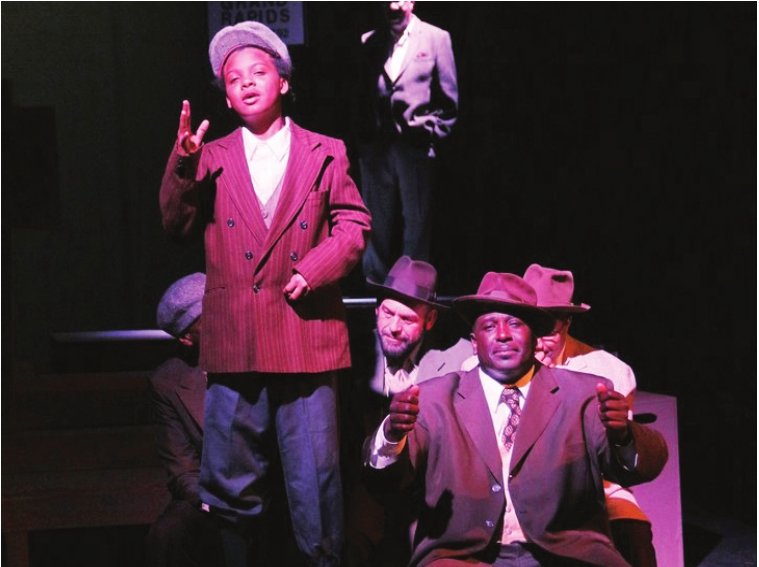
What is most unique about Riverwalk Theatre’s current production of “Bud, Not Buddy” is that the back story is as good as the story of the play itself.
Director Tom Ferris is more of an impresario than a director, having been nudged by Riverwalk’s Sandy Norton to check out the script. He then embarked on a year-long journey of finding a cast of young people and adults to pull it off. Along the way, he bumped into Christopher Paul Curtis, the writer of the novel. Ferris managed to talk him into a book-signing and talk back experience.
He then developed a collaboration with the Lansing School District’s Reading is Fundamental program and arranged a free performance for 250 Lansing school students.
Meanwhile on opening night, Norton pulled together a cadre of volunteers for a pre-performance feast of appetizers and desserts. Kudos to all on the concept of collaboration.
The story itself is set in Michigan, late 1936, in the African-American community, reminiscent of the Depression era that immediately preceded the 30s. Those of us old enough to have heard firsthand from parents and grandparents of that time of abject poverty, can easily imagine how much more difficult it must have been for African-Americans experiencing it.
“Bud, Not Buddy” is the story of just one child, the aforementioned Bud, who has been recently orphaned. Bud is played convincingly by Kavares Luckett-Brown. He brings swagger and conviction, and an entirely appropriate high-pitched squeaky pre-adolescent voice to the role.
He is occasionally joined on stage by an elder-Bud, Chance Boyd, the narrator who, by contrast, adds gravitas to the story line with a basso profundal resonant voice.
In an early scene, young Bud arrives to live at an orphanage and encounters a scattered smattering of other orphans of indeterminate age and with wary hostility.
Fight scenes ensue, and while dialogue is sparse and the children are effective in their roles.
Costume designer Ashley Hampton has taken great care to create authentic Depression era clothing for these children, suspenders and knickers-like pants with paperboy caps for their heads. Bud quickly sizes up the situation and decides he wants nothing to do with it.
He leaves the orphanage, a small suitcase in hand, a single blanket inside for when he sleeps outside in the cold. He is on an existential journey, a search for a biological father. He overnights in Owosso and Grand Rapids, eventually making his way to Chicago.
Along the way, there are ghost-encounters with a deceased bio-mother, who comes and goes, imbuing him with rules for life — e.g. “Rule number 67, live in the moment because forevers are composed of nows.”
Bud’s conversations to the audience are filled with these rules, some of which are lessons learned along the way.
Whereas Act One begins with the orphaned children, Act Two belongs primarily to the adults in the cast, specifically the jazz band players—one of whom Bud suspects is his bio- father. This is the meatiest portion of the play where several male actors shine. Guy Thomas is Herman E. Calloway, the suspected father figure who wants nothing to do with Bud. Thomas is outstanding. His interactions with Luckett-Brown are crisp and finely tuned.
Eric Smith, another band member, is Steady Eddie, who mentors and protects Bud from the overt hostility of Calloway. Smith is a natural in this role, fatherly and gentle, making up for Calloway’s brusqueness.
All the band members contribute much to the solidity of the script. Janell Hall, as the jazz singer Ms. Thomas, holds the group together with fine stagecraft movement.
A plot twist resolves Bud’s search for a father. The play ends with Bud being presented with a saxophone. This is a coming-of-age moment, a window of opportunity into a whole new world of meaning and purpose.
Audiences love talk-backs, especially with authors, and in this instance Christopher Paul Curtis charmed everyone.
“Bud, Not Buddy” Thursday, April 26, 7 p.m.
Friday, April 27, 8 p.m. Saturday, April 28, 8 p.m. Sunday, April 29, 2 p.m. Riverwalk Theatre 228 Museum Dr., Lansing Tickets start at $12 www.riverwalktheatre.com
Support City Pulse - Donate Today!
Comments
No comments on this item Please log in to comment by clicking here